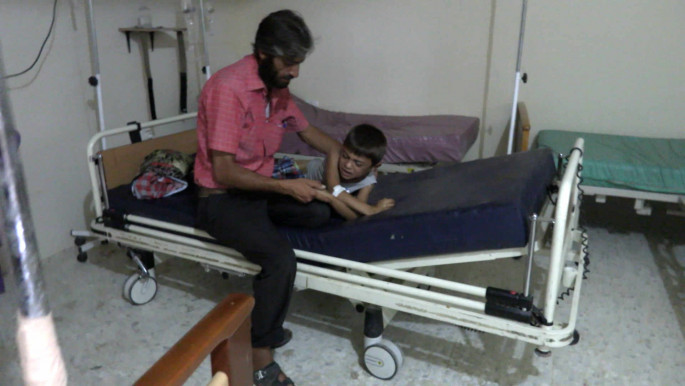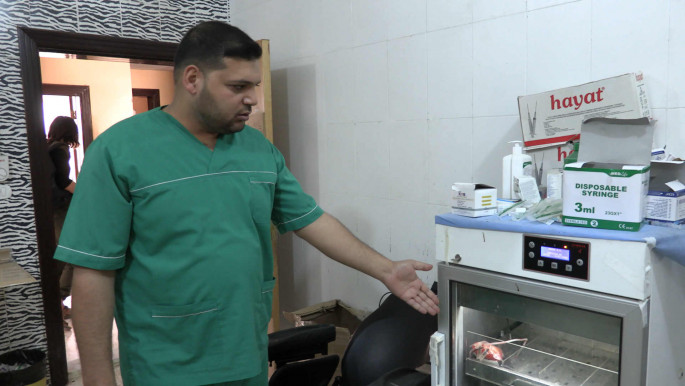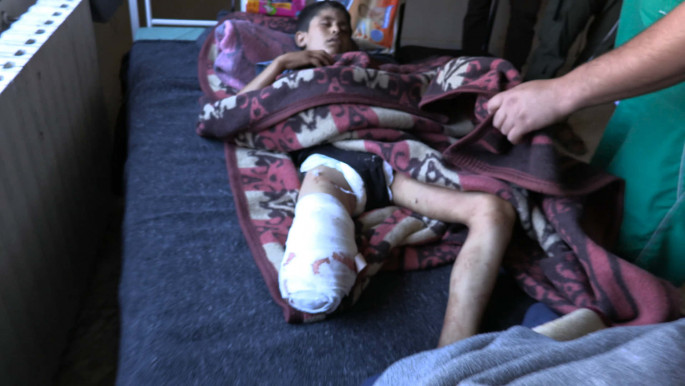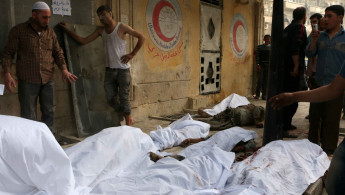Syrian hospital attacks ignored while chemical weapons grab headlines
Seconds later, the impact of a bomb dropped onto the hospital knocked him off his feet and scattered medical supplies like confetti.
Momentarily stunned, he watched as patients and hospital staff rushed to either the building's basement or out of the front doors. He tried to decide whether it was best to flee or stay put. Jets often strike twice in Syria - the "double tap" - in which a second bomb is dropped after rescuers have arrived to assist victims of the first.
He decided to make his way to the basement. He'd been safe there the last time the hospital was bombed.
When the dust settled, Issa learned that a fellow nurse was injured in the blast and needed to have one of his legs amputated. Five patients were killed.
Atareb hospital is one of the few remaining in the rural area west of Aleppo city. Issa's brother, Doctor Abdulrahman Obaid, gave The New Arab a tour of the facility last summer.
"We try not to keep patients here very long," he said. "We're afraid of bombings. Hospitals are among the aircrafts' top targets."
Atareb hospital has been bombed nine times.
Physicians for Human Rights has documented more than 400 attacks on hospitals in Syria since the start of the war in 2011. The Assad regime and its allies are responsible for more than 90 percent of these.
A small, windowless room under the hospital stairs holds a young boy recovering from urological surgery. "This room is safer because it's under the stairs," says Dr Obaid. "If there's a bombing, it will remain intact."
 |
|
| This boy is recovering from surgery in the safest room in the hospital - under the stairs [Lindsey Snell] |
Dr Obaid says the vast majority of his patients are civilians who come for routine medical care.
"But when there is a bombing, the emergency department is full of people. Horrible injuries and amputations are an everyday occurrence."
He pointed to a bloodstained hospital bed. "No matter how hard we try, we cannot wash off the blood. There is always more."
After a bombing, many of the most seriously injured are transferred to other hospitals in Syria, or sent to the Turkish border. The hospital in Atareb doesn't have adequate supplies or staff to treat them. Many die in transit.
| Article continues below video |
| Video: Dr Obaid takes us on a tour of Atareb hospital |
Aside from the frequent bombings, the hospital struggles to provide routine medical treatment. "We treat people from all over the area every day, but we have no support and no supplies. There is no pediatrician, no specialists.
"Most of our equipment is out of order. Sometimes, we can't do the simplest procedures here because we don't have the necessary machines. And all the organisations know this."
Obaid says the only blood tests they can reliably perform are to determine blood type. "But the more complex tests…and these are vital tests… cannot be done here."
He opened the door to a makeshift laboratory. "It's full of old machines. Most don't work."
 |
|
| Dr Obaid shows the near-empty blood bank [Lindsey Snell] |
On the counter sits a urinalysis machine that is no longer turned on.
A small medical refrigerator holds a few bags of blood. "This is a blood bank, but it's almost empty. The next time there is a bombing, we won't have enough. We never have enough."
In an adjacent room, two elderly patients are undergoing dialysis. "This is one of the most important functions of this hospital. We have many chronic cases, people who need dialysis twice a week. But we only have five machines."
Dr Obaid says the NGOs who are supposed to support hospitals in opposition-held Syria aren't giving them what they need. "They're a kind of mafia that wants to benefit from the tragedy of the Syrians. The financial support and donations that the Syrians are receiving aren't being used in the right place. They don't listen to what we need. They only want to support what could bring financial resources to them in the future."
Some of the support organisations' reluctance might stem from a fear that funding or facilities given will be used to treat militants rather than civilians - a claim Dr Obaid rejects. "Almost all of the patients here are civilians. They act as though the patients here are terrorists. How can these civilians injured by airstrikes be terrorists?
"The organisations only want to support childbirth and gynecological functions. We have more than enough sonogram machines, but I don't have an X-ray machine."
The lack of equipment leads to deaths that would be otherwise preventable. "Children and women die every day. Seniors die everyday. Why? Because we have no equipment. We don't have enough doctors, and we can't pay the doctors we do have."
Dr Obaid approaches the bed of an unconscious young boy.
 |
|
| An airstrike had blown this boy's foot off [Lindsey Snell] |
He pulls back the covers and revealed a bloody, bandaged stump under the boy's right knee.
A recent airstrike on a civilian neighbourhood has blown off the boy's foot, necessitating an amputation.
"Our goal is to treat civilians, like this child," he says. "Innocent people hurt by this war."
Dr Obaid says he's glad for the international attention Syria is receiving following last week's chemical attack but is frustrated that the return to the spotlight is only fleeting.
"It's because it was a chemical attack, and people have only seen it a few times in Syria. But six years of barrel bombs and missiles and white phosphorous dropped on us… Is it boring to them?"
Lindsey Snell is a journalist covering conflict and crises across the Middle East and North Africa. Follow her on Twitter: @LindseySnell


![Minnesota Tim Walz is working to court Muslim voters. [Getty]](/sites/default/files/styles/image_684x385/public/2169747529.jpeg?h=a5f2f23a&itok=b63Wif2V)






